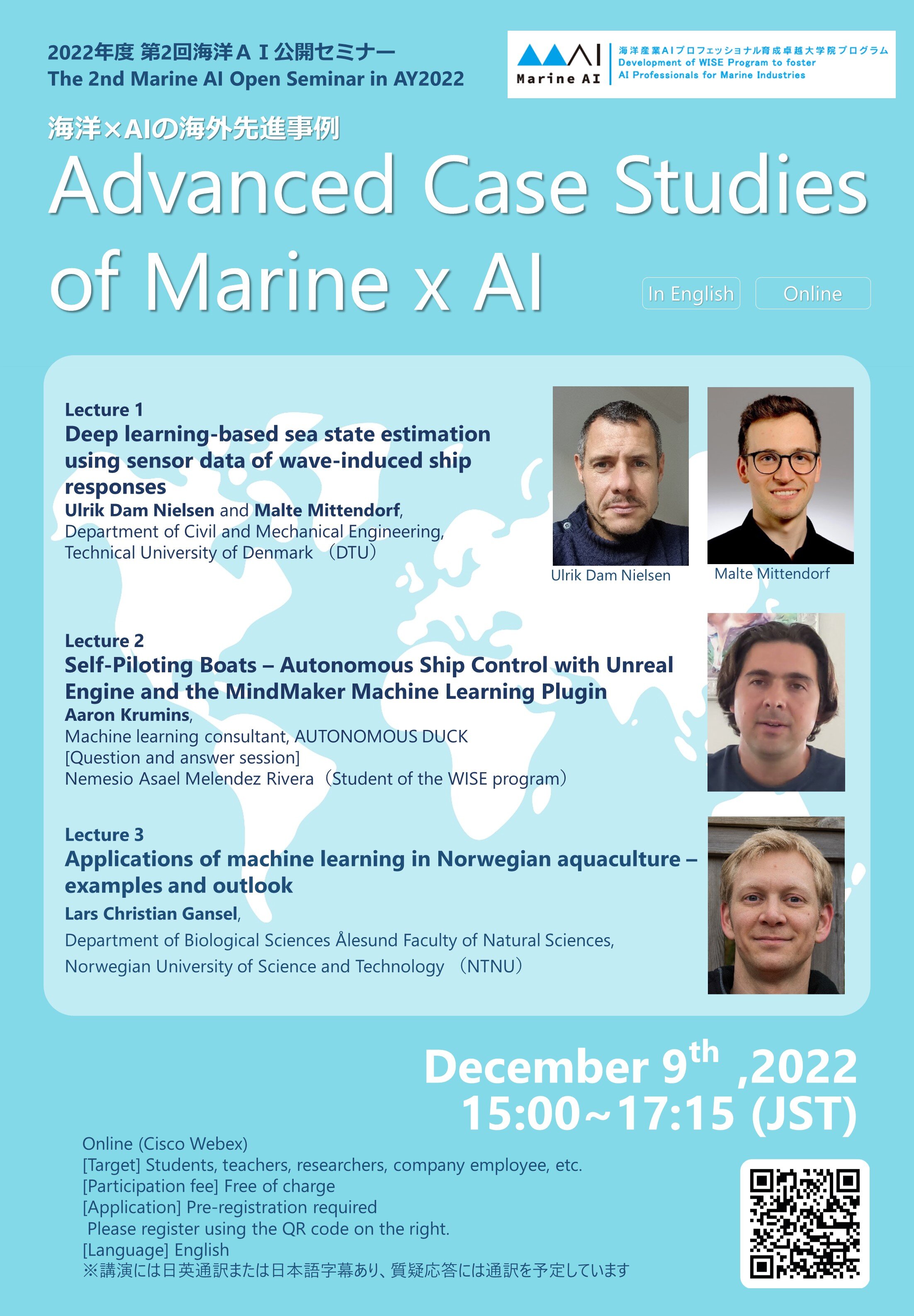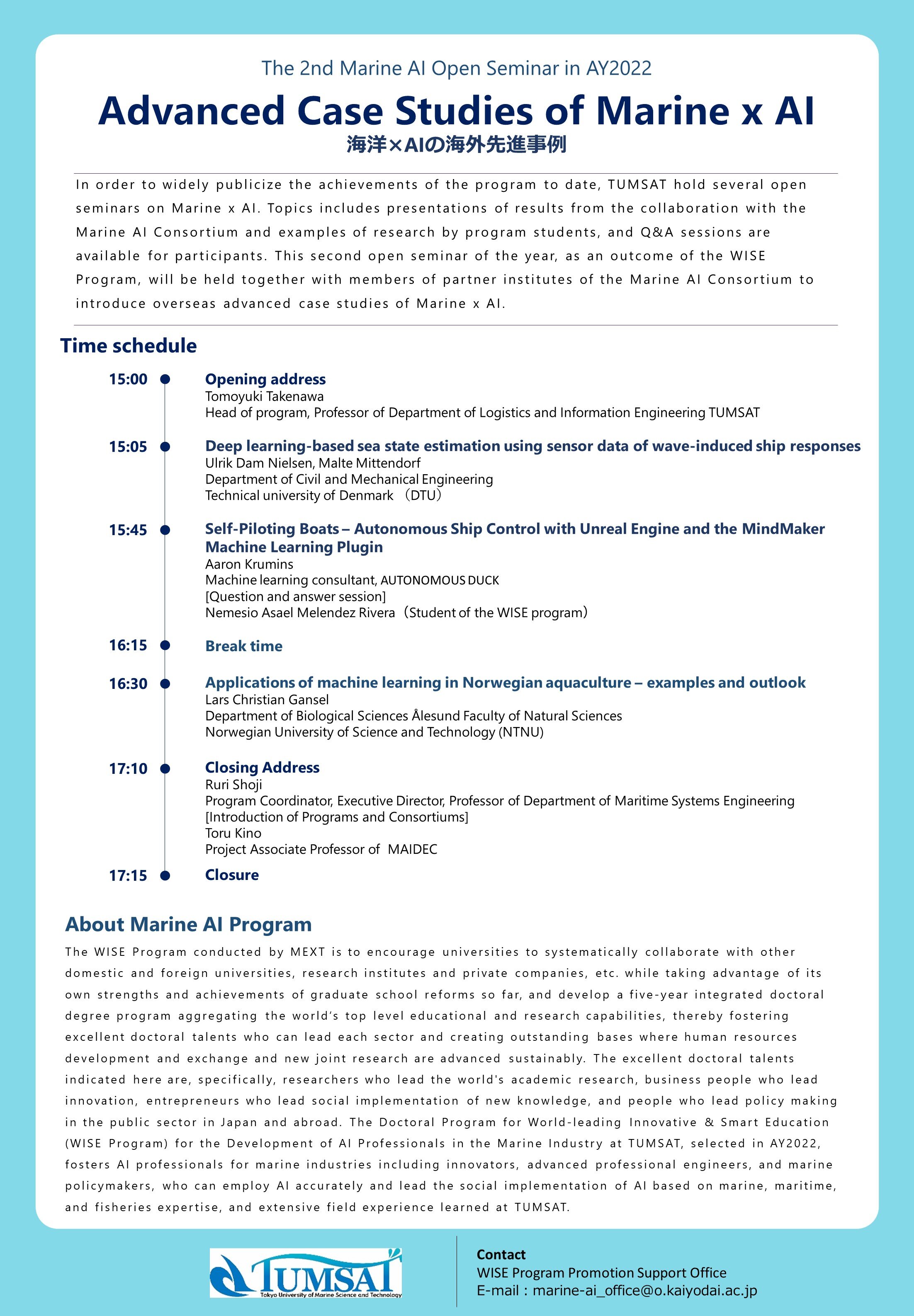ACTIVITYActivity reports
- HOME
- Activity reports
- Archive The 2nd Open Seminar on Marine AI in FY2022 "Advanced Case Studies of Marine x AI" (Video)
Archive
The 2nd Open Seminar on Marine AI in FY2022
"Advanced Case Studies of Marine x AI” (Video)
On December 9th, TUMSAT held the 2nd Marine AI Open Seminar focused on " Advanced Case Studies of Marine x AI " in collaboration with the Marine AI Consortium including Q&A session. There were 123 participants, including speakers. As in the 1st Marine AI Open Seminar, it was conducted online to prevent the spread of COVID-19.
Lecture 1 「Deep learning-based sea state estimation using sensor data of wave-induced ship responses」
Ulrik Dam Nielsen and Malte Mittendorf,
Department of Civil and Mechanical Engineering,Technical University of Denmark (DTU)
The presentation is addressing a machine learning-based approach for sea state identification using the wave buoy analogy. Measurement data of a Panamax container vessel sailing in the Northern Atlantic is utilized and neural networks are trained on time and frequency domain features derived from 6-DOF accelerations for the prediction of integral sea state parameters. The frequency domain model is trained on sequences of spectral ordinates derived from cross response spectra, while the time domain model is applied to 5-minute time series of ship responses. Additionally, multi-task learning was employed and the frequency domain method stood out in terms of accuracy and efficiency.
Video Link to Youtube
Lecture 2 「Self-Piloting Boats - Autonomous Ship Control with Unreal Engine and the MindMaker Machine Learning Plugin」
Aaron Krumins,
Machine learning consultant, AUTONOMOUS DUCK
The MindMaker AI Plugin is an open-source plugin that enables games and simulations within UE4 and UE5 to function as OpenAI Gym environments for training autonomous machine learning agents. The plugin facilitates a network connection between an Unreal Engine Project containing the learning environment, and a python ML library that receives data from Unreal Engine and parses into a custom OpenAI Gym environment for training the agent. Possible applications extend beyond game design to a variety of scientific and technical endeavors. These include robotic simulation, autonomous driving, generative architecture, procedural graphics and much more. We have explained one of the ways to approach autonomous boat navigation gamifying it. That is, we create a scenario in which our A.I. gets rewarded if it successfully learns to steer around objects and avoid collisions. Thanks to reinforcement learning, we can use trial and error methods to reward the A.I. if it takes an action, avoids a collision, and punish it If it does collide.
Video Link to Youtube
Lecture 3 「Applications of machine learning in Norwegian aquaculture - examples and outlook」
Lars Christian Gansel,
Department of Biological Sciences Ålesund Faculty of Natural Sciences,
Norwegian University of Science and Technology (NTNU)
Salmon aquaculture is complex, and models based on machine learning enable fast analyses of diverse and disparate data to solve important challenges to improve and increase salmon production sustainably and responsibly. This presentation gives examples including image analyses for the monitoring of wild and farmed fish, evaluation fish welfare, biomass distribution and behavior and AI use for fast prototyping and predictions. Equipment suppliers and researchers are active in the development of tools for the fish farming industry, and public administration has signaled the possibility to change regulations to AI-supported monitoring and reporting on production and health parameters.



